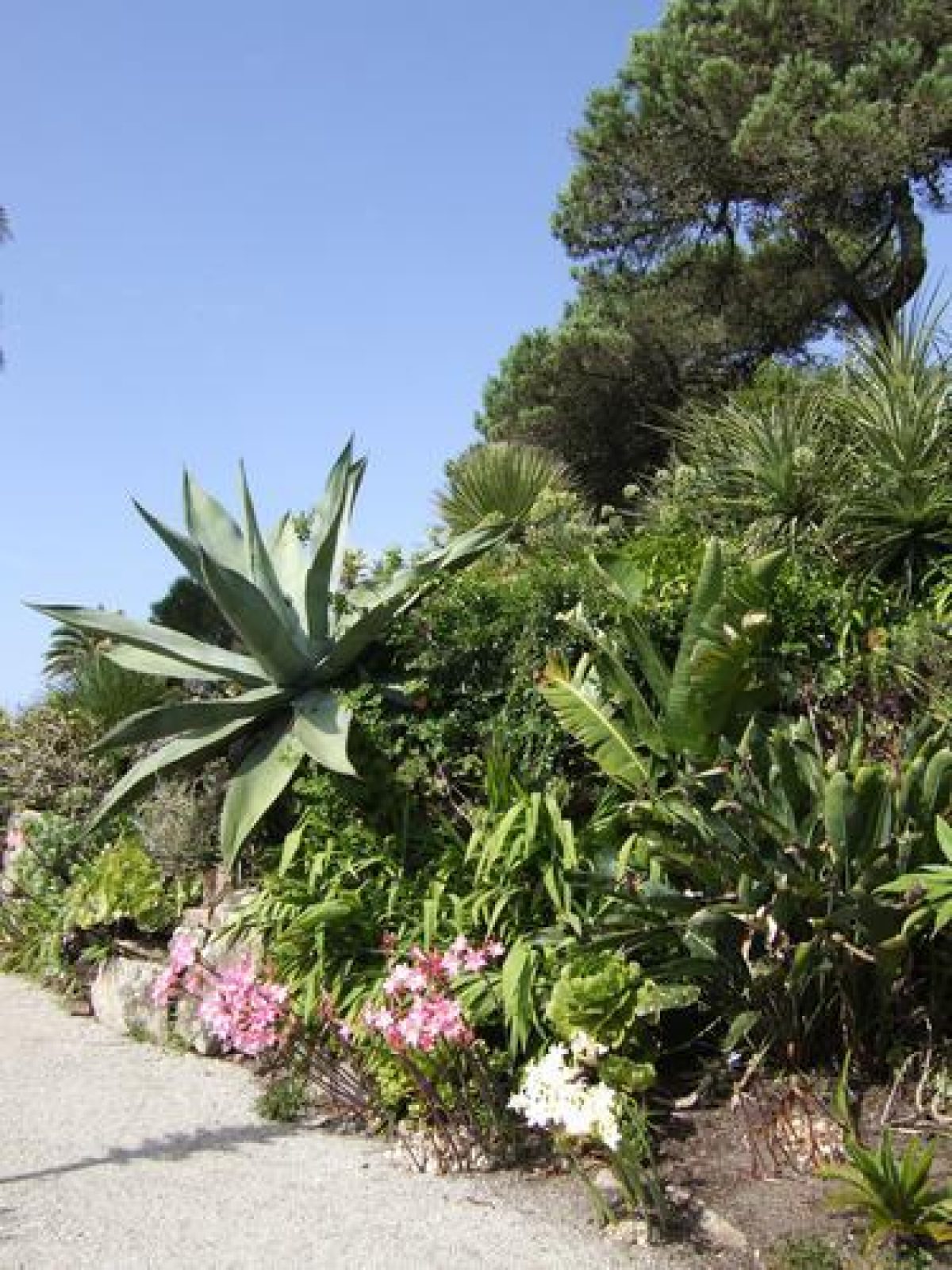
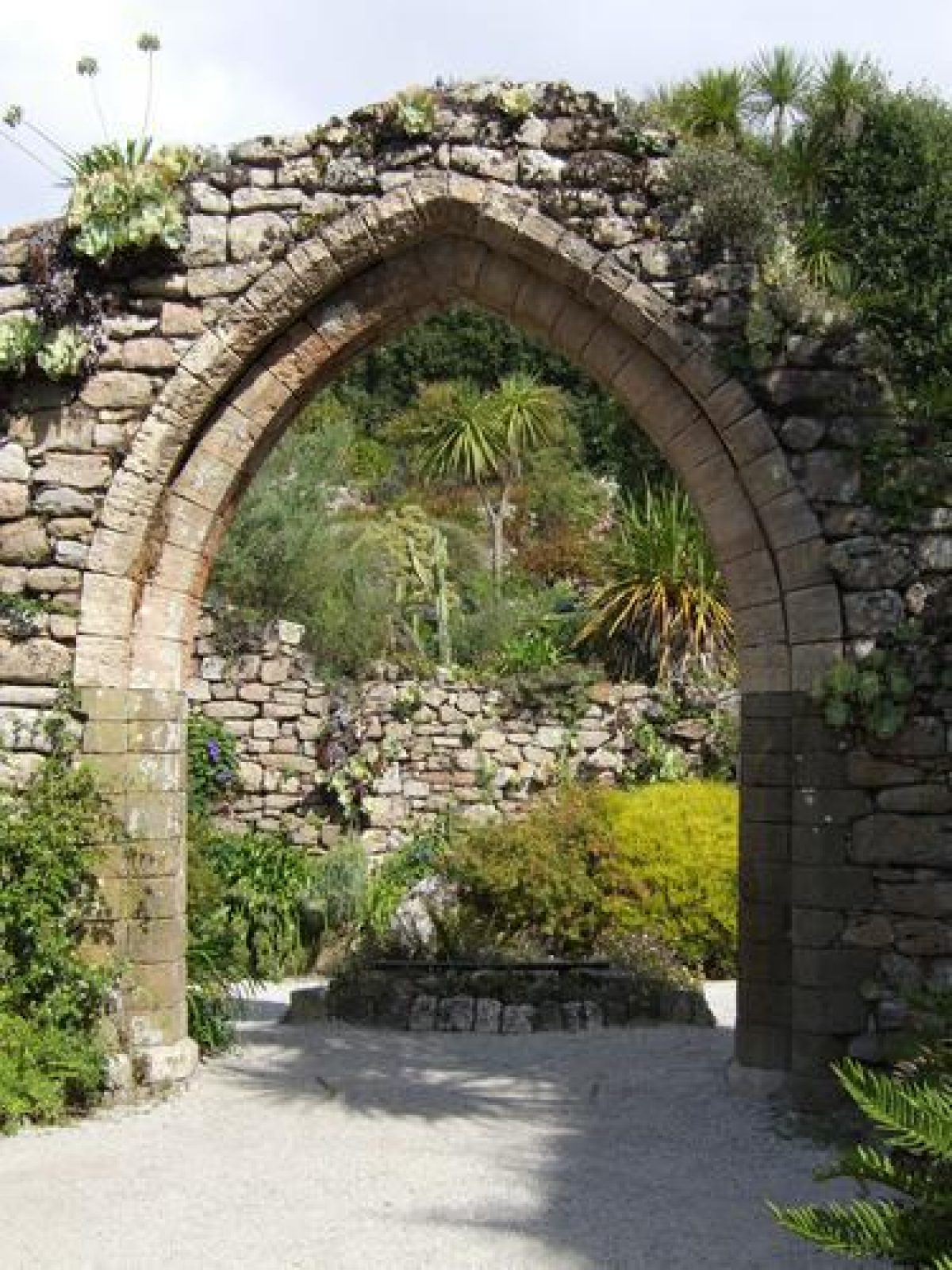
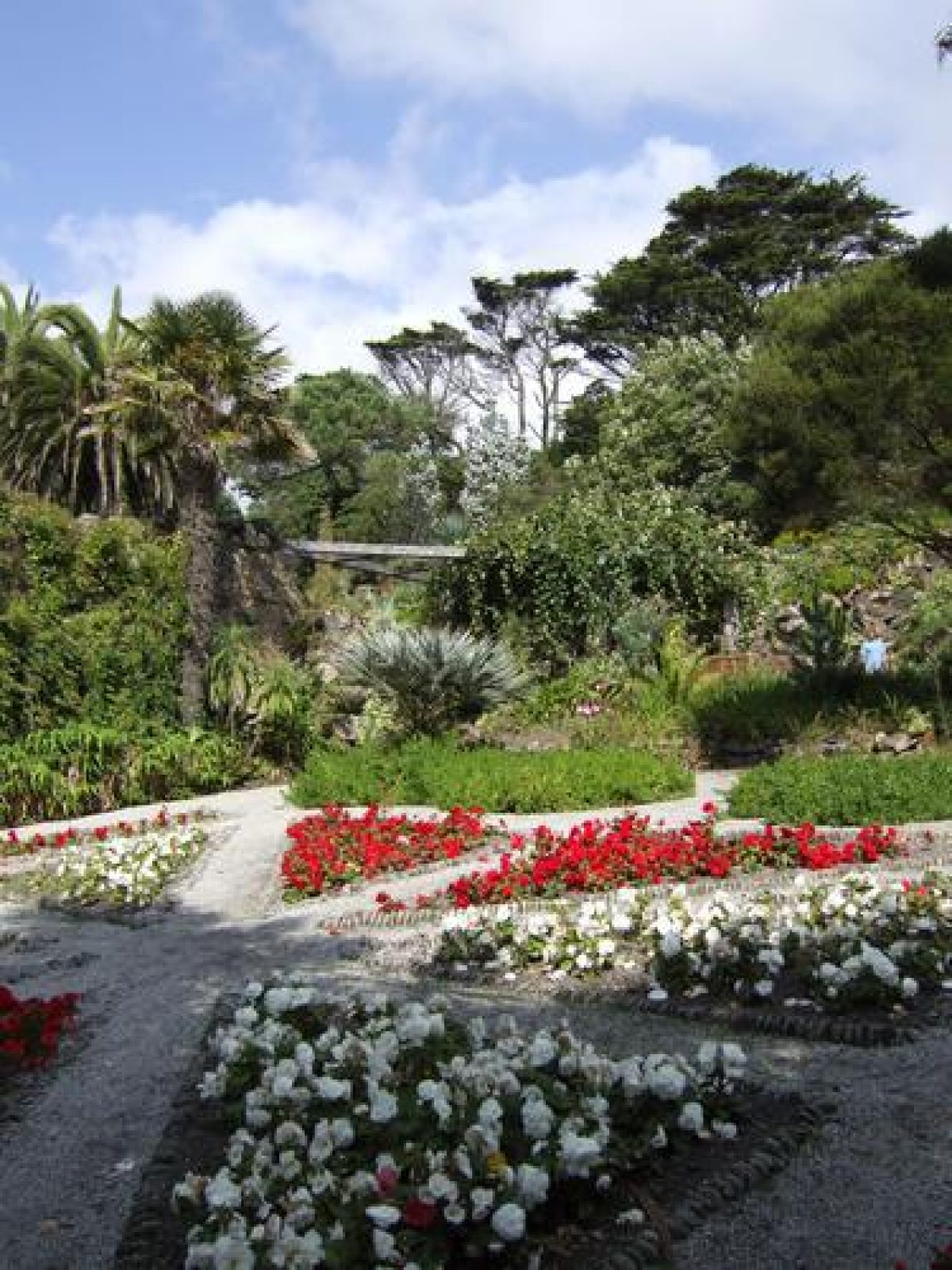
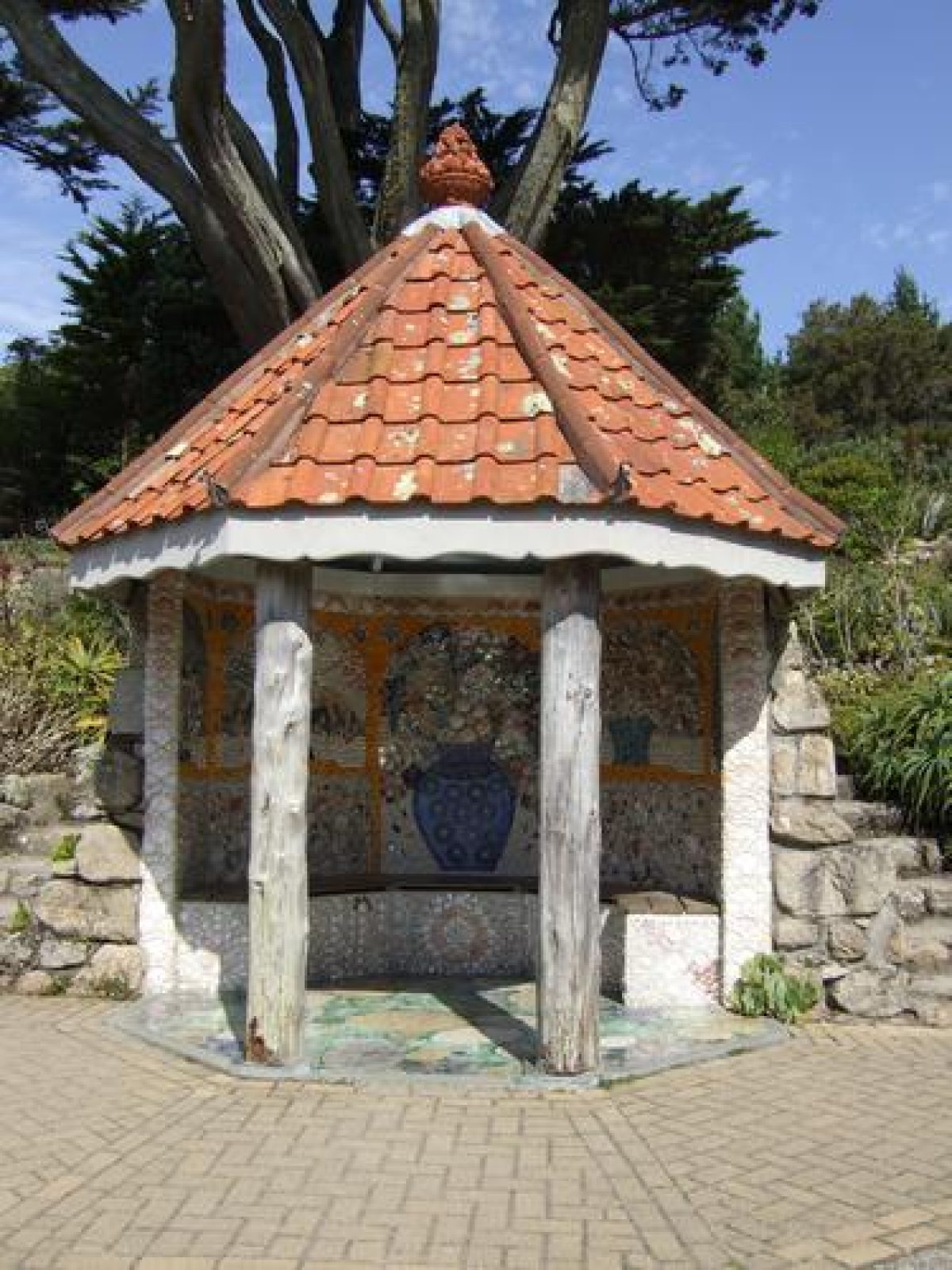
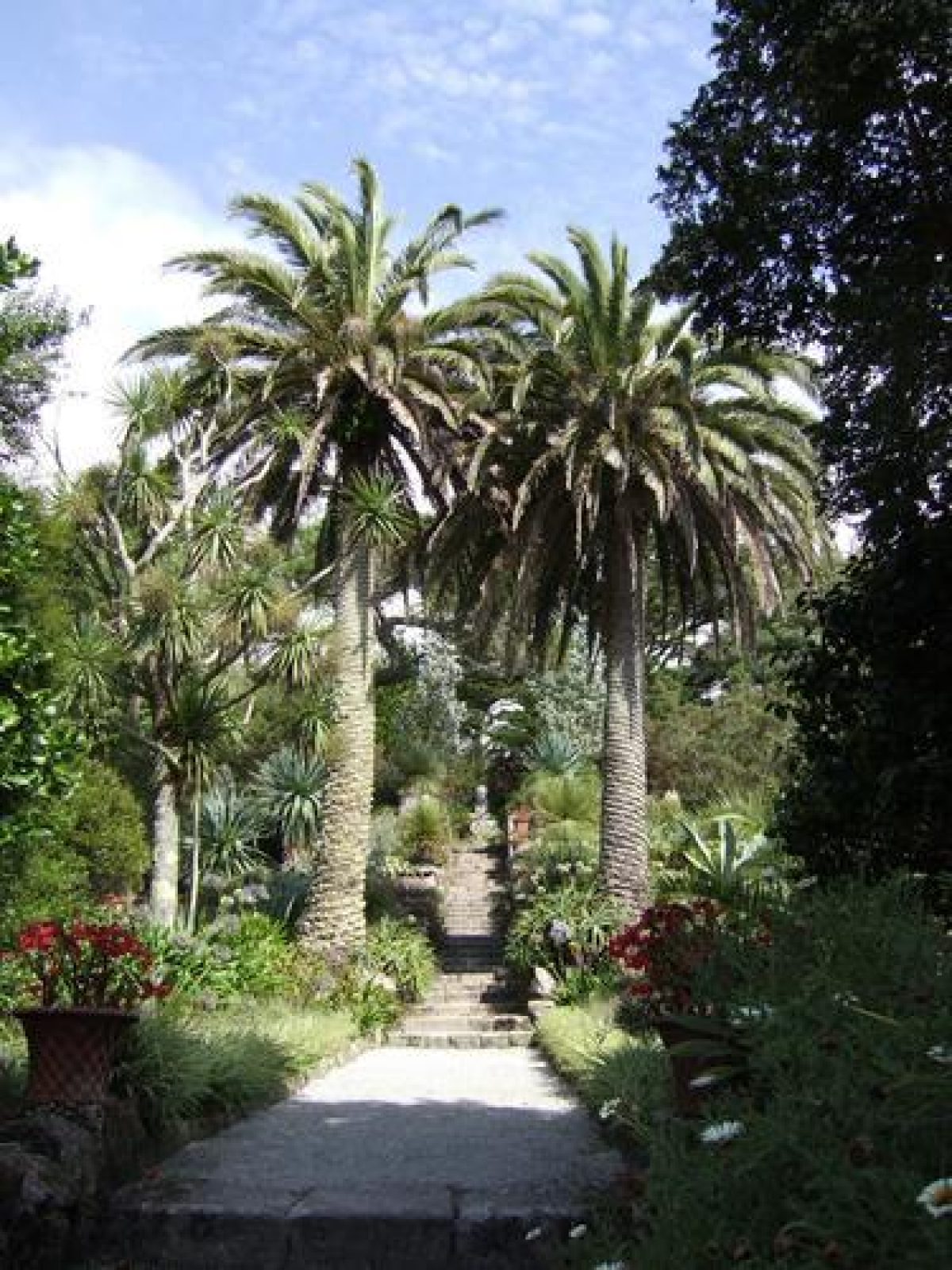
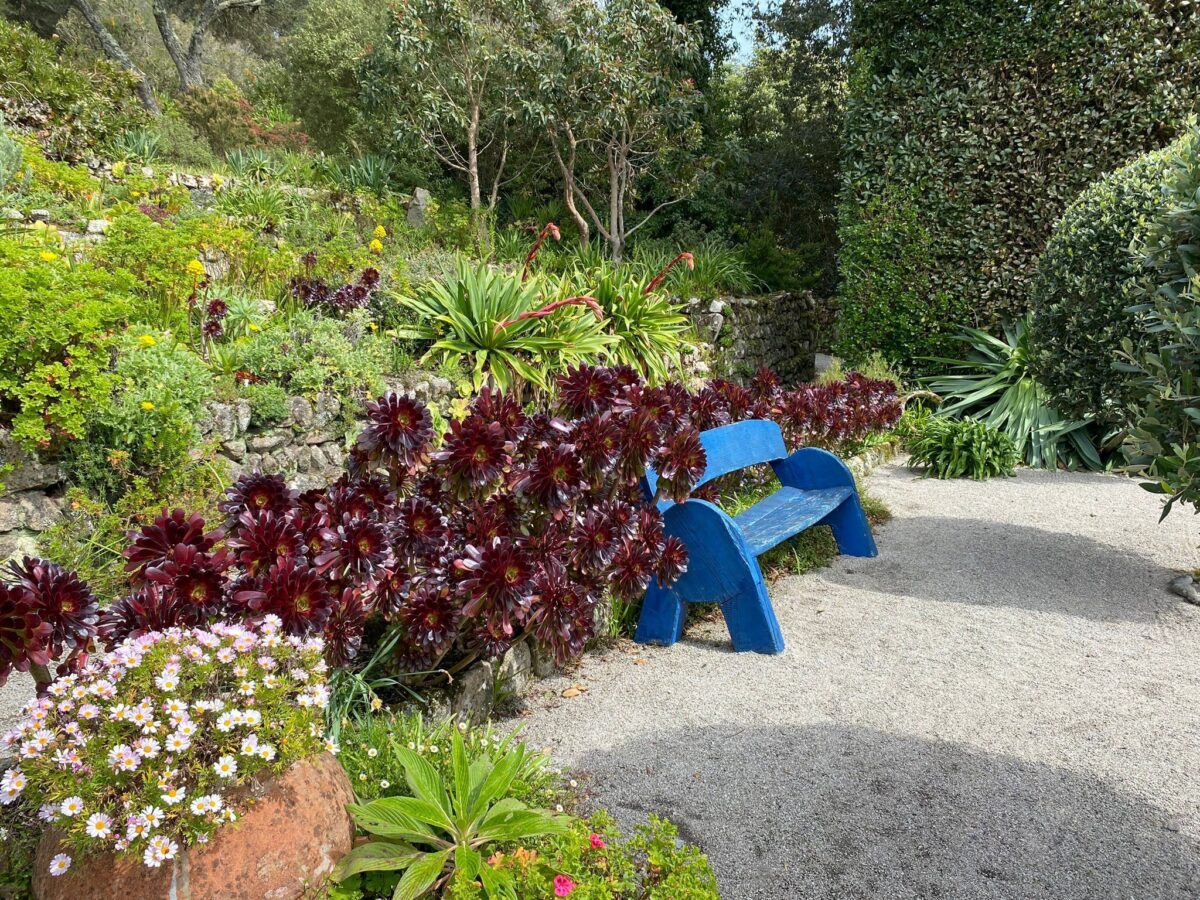
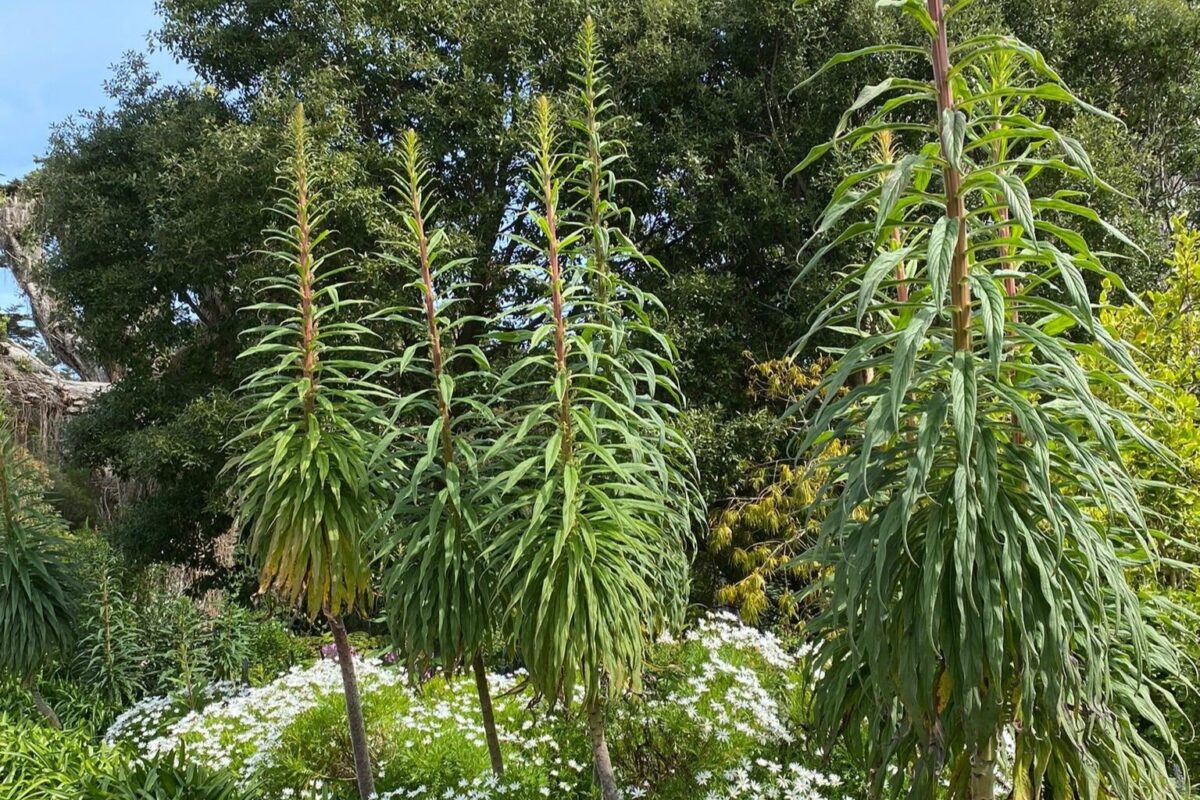
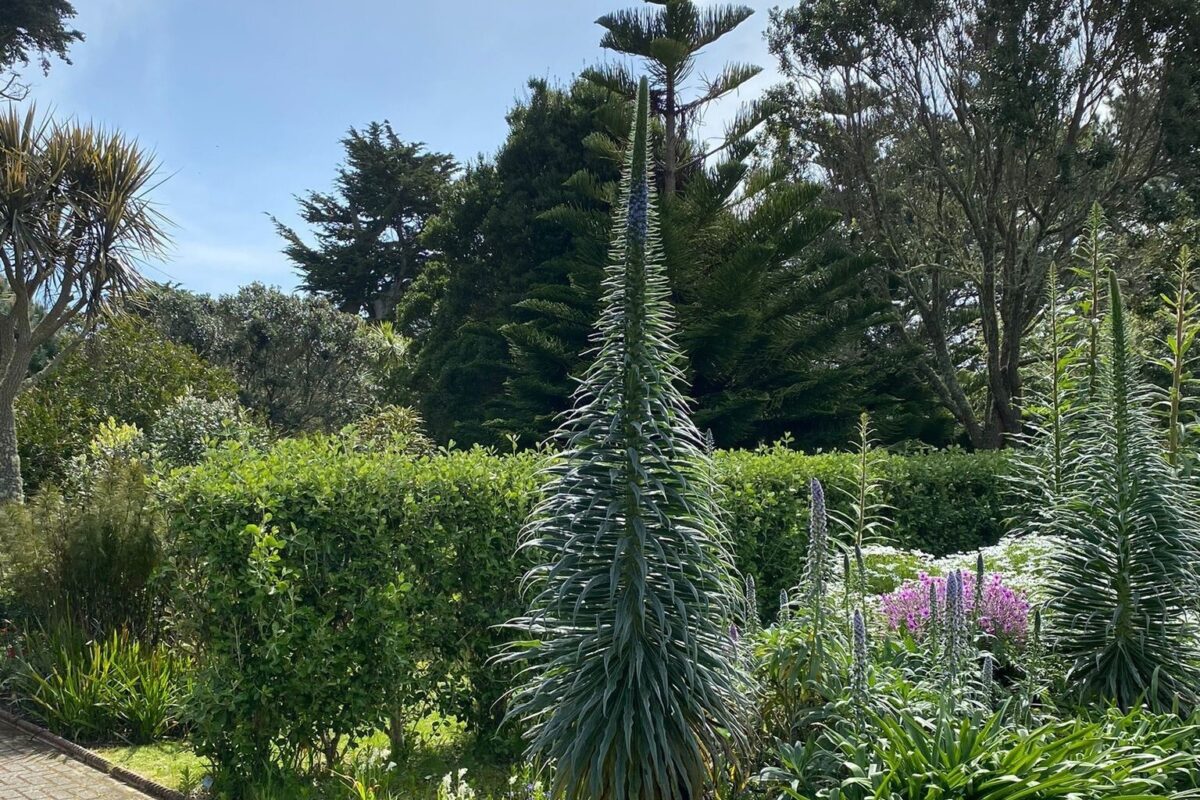
Introduction
Tresco Abbey Garden is a 19th century sub-tropical garden with a formal plan. It covers 7 hectares, within further woodland of around 17 hectares.
Terrain
The site occupies a ridge of high ground which drops north to Great Pool, west towards the coast adjacent to Appletree Road, south to Appletree Banks, and south-east to Abbey Pool.The following is from the Register of Parks and Gardens of Special Historic Interest. For the most up-to-date Register entry, please visit the The National Heritage List for England (NHLE):
www.historicengland.org.uk/listing/the-list
Gardens extensively planted with exotic species which were begun in the early 19th century and developed in the mid- and late 19th century, together with a lake and woodland walks.
DESCRIPTION
Location, Area, Boundaries, Landform and Setting
Tresco Abbey is situated on the island of Tresco towards the centre of the Scillonian archipelago. The site lies some 400m south of the hamlet of New Grimsby and 1.25km south of the port of Old Grimsby. The approximately 30ha site comprises roughly 6ha of gardens and 24ha of ornamental plantations through which a series of walks passes, an ornamental lake, and a cricket ground. The site is bounded to the west by a minor road, Appletree Road, and to the north by Great Pool; elsewhere the site adjoins open heathland. The site occupies a ridge of high ground which drops north to Great Pool, west towards the coast adjacent to Appletree Road, south to Appletree Banks, and south-east to Abbey Pool. There are extensive views south across the island towards the picturesque Great Rock and the neighbouring island of St Mary's, west towards the neighbouring island of Bryher, and north across Great Pool towards high ground near Old Grimsby.
Entrances and Approaches
The late 20th century visitors entrance is situated roughly 30m south-west of Tresco Abbey and is approached by a concrete drive which follows the southern boundary of the site from the late 20th century helicopter landing site on the cricket ground around 200m south-west of the house. The entrance, ticket office, and associated facilities are converted from 19th century single-storey stone buildings which stand immediately west of the mid 19th century south entrance to the Abbey. This entrance comprises rugged rockwork supporting a painted timber gate. Beyond the south entrance the drive leads north for approximately 30m through mixed shrubbery before sweeping west and north-east through the West Rockery, an area of artificially arranged rockwork above pools and a cascade, to reach the inner courtyard of the Abbey.
In the late 19th and early 20th century visitors entered the gardens through a gate attached to the building known as 'Valhalla'. This approximately L-shaped structure comprises a two-storey gabled cottage to the west with a single-storey range to the east. The garden facades of these structures have loggias supported by rustic stone piers; the loggias contain a collection of ships' figureheads which was founded by Augustus Smith in the mid 19th century, while the walls are decorated with sea shells. Valhalla was constructed by Augustus Smith in 1871 to serve as an entrance for the visitors who had first started to visit the gardens in appreciable numbers around 1860 (Nelhams 2000); it was extended in 1960 by Commander T M Dorrien-Smith (CL 1980).
The principal 19th century approach to Tresco Abbey was from New Grimsby to the north-west. From the hamlet a drive, known as Abbey Road, passes along the north-west shore of Great Pool, before turning south-east to continue parallel to the southern shore of the lake for around 750m. To the south the concrete drive is bounded by Abbey Wood, a mixed plantation with mature trees and conifers underplanted with evergreen shrubbery, while to the north the drive is adjoined by an area of meadows planted with specimen trees and several paddocks; the drive is partly lined by mature Monterey cypresses.
The drive approaches the Abbey through a picturesque gothic granite gatehouse (listed grade II) which is set in a granite wall (listed grade II). The wall extends south-east to the Abbey buildings and serves as the revetment to the raised entrance courtyard. The gatehouse and courtyard were constructed by Augustus Smith in 1843. A further drive extends parallel to the north facade of the Abbey and then continues roughly 430m east, where it is known as Penzance Road, to reach the coast at Pentle Bay. A mid 19th century inscribed slate panel set into the wall enclosing the gardens south-east of the Abbey and adjacent to the drive provided rules and directions for mid 19th century visitors to the gardens.
Principal Building
Tresco Abbey (listed grade II) stands on a spur of high ground to the north of Abbey Pool and south of Great Pool. The house comprises two and three storeys and is constructed in coursed granite with ashlar dressings. The buildings has an irregular plan which reflects its evolution over some thirty years from 1835. To the north is the entrance courtyard entered through the gatehouse of 1843 (listed grade II) and enclosed to the south by the west wing, also built in 1843. An archway leads through this wing to the central courtyard which is enclosed to the south by the south-west wing. This wing contains the state rooms built in 1861-2 and is terminated to the south-west by a single-storey conservatory overlooking the West Rockery (under restoration, 2000). To the east of the courtyard lies the main range of the house with a four-storey square tower to the north-east which was built in 1890 to the north of the gabled, two-storey house built in 1835-9 which remains the core of the house. Tresco Abbey was built by Augustus Smith (d 1872) and his nephew, Thomas Algernon Dorrien-Smith, who appear to have acted as their own architects. The appearance of the house in the mid and late 19th century is recorded in a series of watercolour views by Mrs Frances Le Marchant (private collection), and a set of photographs commissioned by Augustus Smith in the 1860s (private collection).
Gardens and Pleasure Grounds
The gardens are situated principally to the west of the Abbey. A series of three mid 19th century terraces extends below the south facade of the house, connecting the West Rockery and the East Rockery on the east- and south-west-facing slopes below the house. The south-facing slope below the Abbey is laid out in informal terraces which incorporate a 20th century swimming pool and pavilion.
The gardens west of the house are laid out in a series of three principal terrace walks which extend from east to west; these are connected by axial walks which descend the south-facing slope. The Top Terrace extends for roughly 270m west from the house to a gate which leads west to a walk which continues a further 190m west of the garden to reach the late 19th century Smith Monument (listed grade II). This rough granite obelisk nearly 5m high stands on the summit of Abbey Hill overlooking the sound between Tresco and Bryher. The monument was designed by Augustus Smith on his death-bed in 1872 and bears plaques commemorating Augustus Smith, T A Dorrien-Smith, and other members of their families. The Top Terrace comprises a gravel walk, to the north of which is a deep border planted with mixed exotic and succulent plants backed by mature trees, shrubs, and conifers.
Some 50m west of the house a subsidiary walk leads north through an area known as Miss Innis' Garden, to reach a small gateway set in an artificially built-up screen of rockwork; this gateway leads from the garden to a network of walks which extend through Abbey Wood on the north-east-facing slope above Great Pool. The Top Terrace is linked to the lower terraces by the Neptune Steps approximately 80m west of the house. The four flights of steps lead to the Lighthouse Walk and are flanked by specimen palms and other ornamental shrubs, while the Walk is bordered by narrow beds planted with seasonal subjects and by tall ilex oak hedges. To the south the Lighthouse Walk is terminated by a raised bastion which supports a late 20th century bronze sculpture of three of Robert Dorrien-Smith's children by David Wynne (guidebook); from this bastion there are views across the Green south to Great Rock. The late 20th century sculpture replaces a late 17th century cast-iron cresset or fire-basket (listed grade II) from St Agnes¿ Lighthouse, Cornwall; this was relocated in the late 20th century to a site adjacent to the mid 19th century bowling green east of Valhalla.
The Middle Terrace leads west from the Western Rockery below a series of rocky outcrops planted with specimen trees, shrubs, and succulent plants above the remains of the medieval Priory. Crossing the Neptune Steps, a broad gravel walk continues for around 50m west through a formal garden with a simple summerhouse alcove to the north, and a circular, rock-edged pool and fountain to the south. The south-facing slope above the walk contains rocky outcrops planted with succulents with architectural foliage, while the remainder of the garden has planting with a Mediterranean character (ibid).
To the south-west of this formal garden is an artificial mound, the Limpet Midden, composed of limpet shells deposited from at least Roman times (ibid); there are views east across the gardens from the summit of the mound. Adjacent to the Limpet Midden the Middle Terrace divides into several subsidiary paths, some leading north-west to the Top Terrace and another continuing west to reach a late 20th century octagonal, open-fronted, pyramid-roofed summerhouse, the interior of which is ornamented with shell-work by Mrs Dorrien-Smith. This summerhouse stands on a gravel terrace at the head of the late 20th century Mediterranean Garden which comprises four terraces retained by rustic granite walls and linked by axially arranged single and double flights of stone steps. The second terrace incorporates a centrally placed wall-fountain and semicircular pool, while the lowest terrace has an octagonal pool with a fountain in the form of a bronze Agave sculpted by Tom Leiper placed on the garden's central axis.
Some 130m south-west of the house the Long Walk extends approximately 250m from east to west across the full width of the garden, linking the walk below the ruins of the Priory, the Lighthouse Walk, and Mediterranean Garden. The Long Walk comprises a gravel terrace flanked by stone-edged beds planted with mature evergreen shrubs and specimen trees underplanted with ferns and herbaceous subjects. To the west the walk is now terminated by the 'Sacrificial Altar', a composite group of antique stone fragments which stands immediately east of a stone wall which blocks a western extension of the Long Walk through the kitchen garden to the west boundary of the garden. A further east/west walk extends parallel to the southern boundary of the garden, passing through areas planted with collections of bamboo and tree ferns. The areas between the east/west terraces and north/south walks are planted with collections of plants originating in Australia and other countries; these have been developed in the 20th century in areas planted in the 19th century as orchards.
Some 50m south-west of the house and below the West Rockery a group of small terraced gardens planted with specimen palms and Mediterranean and South African plants is enclosed to the west, south, and south-east by granite rubble walls about 3.5m high (listed grade II), and to the east and north-east by high, formally clipped ilex oak hedges. The western boundary wall is extended north by a late 20th century pergola comprising rustic stone supports linked by timber horizontal beams. To the north are the remains of the medieval Priory of St Nicholas comprising two gothic stone arches which lead to a walled garden enclosure containing several 17th and 18th century graves and headstones (all listed grade II). The arches terminate a vista leading roughly 320m south-south-west which bisects the Palm Circle, an approximately elliptical area of lawns enclosed by shrubbery and planted with specimen Chusan palms and cordylines.
To the south of the Palm Circle the axial walk is terminated by a Cyclopean group of rocks and a stone table. To the north-west of the remains of the medieval Priory is the Pebble Garden, a parterre with pebble-edged beds separated by gravel paths which are laid out in the form of a `Union Jack' flag; this garden and its seasonal planting scheme in red, white, and blue formed part of Augustus Smith's mid 19th century garden. To the south-east of the ruins of the Priory the Pump Garden incorporates a circular stone well and a cast-iron pump which are set among evergreen shrubs and specimen trees.
Augustus Smith built the walls enclosing the formal gardens south-west of the house in approximately 1834 (CL 1980) and later began to plant shelter belts comprising particularly Monterey cypress and Monterey pines; these plantations were extended and enhanced in the late 19th and early 20th century by T A Dorrien-Smith. The Palm Circle, originally known as the Hop Circle from Smiths planting scheme, also formed part of Smith's earliest garden, together with the Neptune Steps, Middle Terrace, Top Terrace, Long Walk, and Lighthouse Walk. The design of the garden with its axial vistas and terraces has been likened to Italian gardens including the Villa d'Este, Tivoli, which may have inspired Augustus Smith. Augustus Smith began to grow rare and exotic plants in the gardens, obtaining specimens from gardens including the Royal Botanical Gardens, Kew, Abbotsbury and Melbury, Dorset (qqv), and nurseries including Messrs Lee of Hammersmith, Thomas Nicholl of Redruth, and from 1853, James Veitch of Chelsea (ibid). By 1894 the gardens contained some 1500 specimens, while by the 1930s this had risen to 3500 distinct varieties (ibid). Throughout the 20th century the gardens have been noted for their collection of sub-tropical, exotic, and acclimatised plants.
Kitchen Garden
The kitchen garden is situated to the west of the gardens roughly 300m west of the house. The garden is enclosed to the south, west, and north by stone walls which separate it from the surrounding shelter belts on Abbey Hill. The garden is laid out with an axial walk extending west to a gate set in the boundary wall. To the north and south of this walk are areas of lawn planted with standard fruit trees, together with vegetable and flower beds.
Other Land
A lawn extends south from an evergreen hedge which encloses the terraces south of the house to Abbey Pool, an informal natural lake approimxately 100m south-east of the house. The ornamentally planted Paddy's Island lies in the lake around 160m south-east of the house, while the margins of the lake are planted with ornamental grasses and other subjects. A late 20th century bronze sculpture of fishes, Shoal by Tom Leaper, stands in the lake adjacent to its north-west shore. In the mid 19th century Augustus Smith developed the lawn and lake south-east of the house as the setting for a collection of exotic waterfowl (ibid). South-west of the lake a level grassy area known as the Green was developed in the late 19th century as a cricket ground; since 1983 it has also served as a helicopter landing place. There are significant views south to Great Rock across the Green.
Abbey Wood, a mixed plantation on the north-east-facing slope above Great Pool is included in the site here registered. Developed from the 1830s, this plantation was designed to combine utility, as a shelter belt for the garden, with amenity, in the form of a series of woodland walks. To the west of the gardens further areas of mixed shelter belt divided by walks and rides extend along the ridge of Abbey Hill. The late 19th century Smith Monument (listed grade II) stands on the crest of this ridge, affording views west to the neighbouring island of Bryher.
References
I W North, A Week in the Isles of Scilly (1850)
S F Tower, Scilly and its Emperor (1873)
Gardeners' Chronicle, ii (1879), pp 659-60, 680-1
N Pevsner and E Radcliffe, The Buildings of England: Cornwall (2nd edition 1970), pp 210-11
P M Synge, The Gardens of Britain II, (1977), pp 134-41
Country Life, 167 (10 April 1980), pp 1094-7; (17 April 1980), pp 1190-3; 173 (17 March 1983), pp 612-14
R King, Tresco: England's Island of Flowers (1985)
D E Pett, The Parks and Gardens of Cornwall (1998), pp 30-2
M Nelhams, Tresco Abbey Garden (2000)
Tresco Abbey Garden, guidebook, (Tresco Abbey Garden no date)
A Tour of Tresco Abbey Garden, guidebook, (Tresco Abbey Garden no date)
Illustrations
S F Tower, Watercolour views of Tresco Abbey and gardens, mid-late 19th century (private collection) [see Country Life 1980; King 1985]
F Le Marchant, Watercolour views of Tresco Abbey and gardens, mid-late 19th century (private collection) [see CL 1980; King 1985]
Photographs of Tresco Abbey and gardens, mid-19th century (private collection) [see Nelhams 2000]
Description written: January 2001
Edited: October 2001
- Visitor Access, Directions & Contacts
Access contact details
The garden is open daily from 10 am until 4 pm.
Owners
Robert and Lucy Dorrien-Smith
Tresco Abbey, TR24 0QQ
- History
The following is from the Register of Parks and Gardens of Special Historic Interest. For the most up-to-date Register entry, please visit the The National Heritage List for England (NHLE):
www.historicengland.org.uk/listing/the-list
HISTORIC DEVELOPMENT
In 1834 Augustus Smith (born 1804), the son of a Hertfordshire banker, James Smith, acquired a lease of ninety-nine years from the Duchy of Cornwall for the Isles of Scilly. The new Lord Proprietor was required by the Crown to spend £5000 within six years on various improvements including the construction of a new pier at St Mary's and the completion of the parish church; inspired by Jeremy Bentham, Smith worked for the social and economic improvement of the islands.
Residing initially on St Mary's, Smith began building a new house on the neighbouring island of Tresco in 1835. The house was built to the east of the ruins of the medieval priory of St Nicholas, a cell of the Benedictine abbey of Tavistock, which in turn occupied the site of a 6th-century burial ground. Smith's new house was extended in 1843, and again in 1852-3; state rooms were constructed in 1861-3 (Country Life 1980). The new house was complemented by terraced gardens, initially constructed within windbreak walls and subsequently expanded within areas sheltered by trees planted by Smith after 1834. Plants for the garden were obtained from nurseries including James Veitch of Chelsea, private gardens such as Abbotsbury and Melbury, Dorset (see descriptions of both these sites elsewhere in the Register), and foreign countries visited by Scillonian seamen. In 1850 Smith initiated contacts with Sir William Hooker (1785-1865) at Kew (see description of this site elsewhere in the Register) which led to plants being sent to Tresco; this arrangement continued under Sir Joseph Hooker (1817-1911). Augustus Smith died in Plymouth in 1872, and was succeeded in the lease by his nephew, Thomas Algernon Dorrien-Smith. The appearance of the house and gardens under Augustus Smith is recorded in watercolour views by Lady Sophia Towers and Mrs Frances Le Marchant, together with a series of mid-19th-century photographs (private collection).
T A Dorrien-Smith was instrumental in establishing flower-growing for the London market in the late 19th century to alleviate a down-turn in the islands' economy, while on Tresco he expanded his uncle's shelter belts and continued the development of the exotic planting in the gardens. Dorrien-Smith died in 1918 when he was succeeded by his son, Major Arthur Dorrien-Smith, who had collected plants in the early years of the 20th century in South Africa, Australia, and New Zealand while on military service. In 1920 Tresco was described as 'an imperial asset of great importance' (Kew Bulletin) in relation to its plant collection and the work undertaken on acclimatisation. During the Second World War three of the Major's four sons were killed, and he was succeeded in 1955 by his surviving son, Lt Commander T M Dorrien-Smith. The development of the gardens, including the introduction of further plant material from South Africa and the Antipodes, continued under the Commander, and his son, Robert A Dorrien-Smith, who took over the running of Tresco in the early 1970s. The gardens and shelter belts have undergone extensive restoration following severe storm damage in 1929, 1987, and 1990. Today (2000) the site remains in private ownership.
- Associated People
- Features & Designations
Designations
The National Heritage List for England: Register of Parks and Gardens
- Reference: GD1395
- Grade: I
Plant Environment
- Plant Type
- Exotic Garden
Style
Formal
Features
- Plantation
- Description: 24 hectares of ornamental plantations.
- Walk
- Description: A series of walks.
- Ornamental Lake
- Pool
- Description: Great Pool.
- House (featured building)
- Earliest Date:
- Latest Date:
- Ruin
- Description: The ruins of the medieval priory of St Nicholas, a cell of the Benedictine abbey of Tavistock.
- Woodland
- Gardens
- Key Information
Type
Garden
Purpose
Ornamental
Plant Environment
Plant Type
Principal Building
Domestic / Residential
Survival
Extant
Hectares
24
Open to the public
Yes
Civil Parish
Tresco
- References
References
- {English Heritage Register of Parks and Gardens of Special Historic Interest}, (Swindon: English Heritage, 2008) [on CD-ROM] Historic England Register of Parks and Gardens of Special Historic Interest
- Pevsner, N. and E. Radcliffe, {The Buildings of England: Cornwall} (Harmondsworth: Penguin, 1970), pp. 210-1 The Buildings of England: Cornwall
- Pett, D E {The Parks and Gardens of Cornwall} (1998) 30-2 The Parks and Gardens of Cornwall